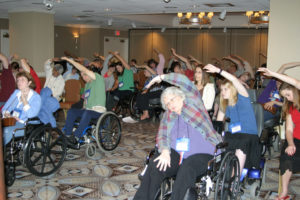Improve the Psychological Well-Being of Patients with Multiple Chronic Diseases with Yoga
By John M. de Castro, Ph.D.
“Yoga can be beneficial for individuals with disabilities or chronic health conditions through both the physical postures and breathwork. Each pose can be modified or adapted to meet the needs of the student. Yoga asanas can be performed while seated in a chair or wheelchair.” – National Center on Health, Physical Activity and Disability (NCHPAD)
The prevalence of chronic diseases has increased with population ageing with around 18% of the elderly having debilitating chronic diseases. “The most common diagnoses are diabetes, stroke, hypertension, cancer, arthritis, asthma, fractures, the presence of an artificial knee or hip, fatigue, multiple sclerosis, demyelinating diseases of the central nervous system, gonarthrosis, ataxia, COPD, dependence on renal dialysis, malignant neoplasm of breast/prostate, depressive episodes, and pure hypercholesterolemia” (Curtis et al., 2016) and dementia.
The situation, however, is much more complex as over half have an additional chronic disease (multimorbidity). This situation has been termed Complex Chronic Disease and Disability (CCDD). Although there are a myriad of combinations, the disease pairs that were significantly associated with the highest likelihood of disability contained dementia (dementia–hip fracture, dementia–cardiovascular disease, and dementia–depression). These individuals are very frail, often confined to bed or wheelchairs. They provide a difficult challenge for caregiving and treatments to help relieve their suffering are badly needed.
Yoga practice has been found to be effective for the prevention and treatment of a large array of chronic psychological and physical problems, even for the elderly in hospice, with cancer, COPD, Kidney Disease, anxiety and depression, and dementia. Hence, it would seem reasonable to hypothesize that yoga may be effective for patients with Complex Chronic Disease and Disability (CCDD). In today’s Research News article “Evaluation of a Specialized Yoga Program for Persons Admitted to a Complex Continuing Care Hospital: A Pilot Study.” See summary below or view the full text of the study at:
https://www.ncbi.nlm.nih.gov/pmc/articles/PMC5223015/
Curtis and colleagues performed a pilot study of the effectiveness of yoga practice for male and female elderly (average age 63 years) in an institution with Complex Chronic Disease and Disability (CCDD). Most were in wheelchairs or had severe mobility issues.
The patients were provided with a Hatha Yoga program modified for practice in a sitting position, once a week for 8 weeks and were provided with recordings to guide personal daily practice. The practice included relaxation, body scan, and yoga postures. They were measured prior to, midway through, and after the practice for pain, pain catastrophizing, including rumination, magnification, and helplessness, perceived stress, anxiety and depression, perceived injustice, mindfulness, self-compassion, and spiritual well-being, including peace and meaning. They found that the yoga practice benefited the patients increasingly as the practice continued over the 8 weeks producing significant reduction in anxiety and pain magnification, and increases in self-compassion.
These are interesting results and suggest that yoga practice may be beneficial for chronically disabled patients with multiple diseases, improving their psychological well-being. This is a very difficult group to care for and treat and as such, the fact that yoga practice may be helpful, is exciting. It should be mentioned that this was a pilot study, without a control condition, and thus no firm conclusions can be reached. But, the results provide evidence and a rationale for conducting a large randomized controlled clinical trial in the future. A program that can help ease the suffering of these afflicted individuals would certainly be warmly welcomed both by the patients and the caregivers.
“Yoga therapy is very much about the whole person. It is complementary to physical therapy, but we take into account that back pain may be related to an emotional element, or it may be from lifestyle, some pattern that is not serving them, physical movement patterns or other patterns.” – Janice Gate
CMCS – Center for Mindfulness and Contemplative Studies
This and other Contemplative Studies posts are also available on Google+ https://plus.google.com/106784388191201299496/posts and on Twitter @MindfulResearch
Study Summary
Curtis, K., Kuluski, K., Bechsgaard, G., Ridgway, J., & Katz, J. (2016). Evaluation of a Specialized Yoga Program for Persons Admitted to a Complex Continuing Care Hospital: A Pilot Study. Evidence-Based Complementary and Alternative Medicine : eCAM, 2016, 6267879. http://doi.org/10.1155/2016/6267879
Abstract
Introduction. The purpose of this study was to evaluate a specialized yoga intervention for inpatients in a rehabilitation and complex continuing care hospital. Design. Single-cohort repeated measures design. Methods. Participants (N = 10) admitted to a rehabilitation and complex continuing care hospital were recruited to participate in a 50–60 min Hatha Yoga class (modified for wheelchair users/seated position) once a week for eight weeks, with assigned homework practice. Questionnaires on pain (pain, pain interference, and pain catastrophizing), psychological variables (depression, anxiety, and experiences with injustice), mindfulness, self-compassion, and spiritual well-being were collected at three intervals: pre-, mid-, and post-intervention. Results. Repeated measures ANOVAs revealed a significant main effect of time indicating improvements over the course of the yoga program on the (1) anxiety subscale of the Hospital Anxiety and Depression Scale, F(2,18) = 4.74, p < .05, and ηp2 = .35, (2) Self-Compassion Scale-Short Form, F(2,18) = 3.71, p < .05, and ηp2 = .29, and (3) Magnification subscale of the Pain Catastrophizing Scale, F(2,18) = 3. 66, p < .05, and ηp2 = .29. Discussion. The results suggest that an 8-week Hatha Yoga program improves pain-related factors and psychological experiences in individuals admitted to a rehabilitation and complex continuing care hospital.
